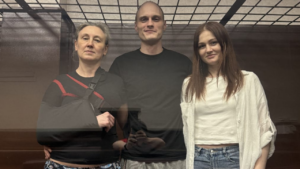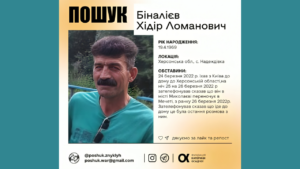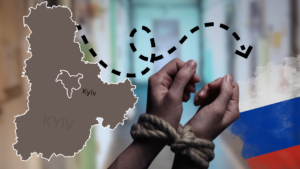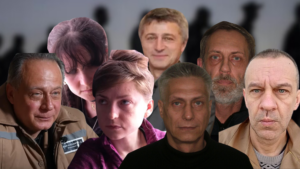Hostages in Russia. How an ATO ex-soldier, Andrii Harasymenko, was abducted in the Chernihiv region and where he is now
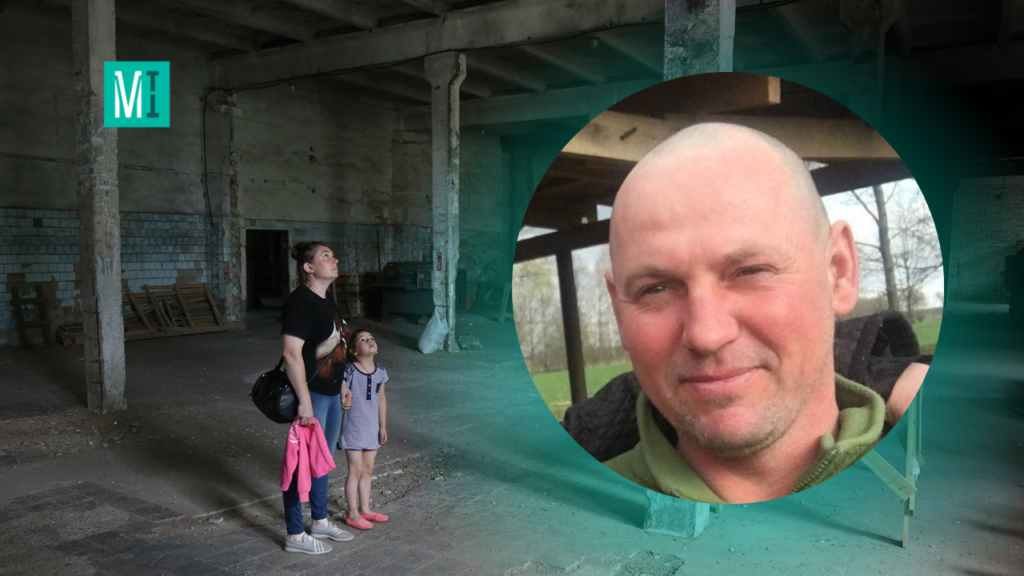
During the last year’s occupation of the Chernihiv region, Russian military personnel abducted men, held them captive, and interrogated them in torture chambers in the Vyshneve village and Horodnia town. MIHR recounts the story of Andrii Harasymenko, a gas service master from the village of Novoukrainske, his abduction, and transportation to a Russian prison.
MIHR visited Andrii Harasymenko’s family in the village of Novoukrainske in the Chernihiv region, which was under Russian occupation from February 24 to March 31, 2022. It is located approximately 27 kilometers from Chernihiv.
Novoukrainske is the home of Andrii Harasymenko, an ex-soldier who was abducted and held hostage by Russia. Now his family – his wife Natalia and daughters Tetiana and Sofia – reside here. “There is a gas terminal and storage station nearby, where my husband worked as a master. He has been a civilian since 2018 after serving under contract at the State Border Guard Service of Ukraine. From 2016 to 2017, he served in Donbas. In recent years, we enjoyed a tranquil and ordinary life tending to our cattle, farming, sowing grain, and raising our daughters. We had a peaceful, typical village life. I work in a library,” explains Nataliia Harasymenko.
The military swooped in, surrounded and interrogated, and then took Andrii away
The Harasymenko family met the start of the Russian invasion at home. The day before, on February 23, Andrii received a draft notice, so he went to the local recruitment center on February 24. However, he was not accepted into the army because of his kidney disease. On that same day, the man went to a hospital in Chernihiv. “He was scheduled to undergo surgery on February 25 for kidney stones. But the occupation began, and it was impossible to get to Chernihiv,” shares Nataliia Harasymenko.
She notes that shortly after her husband returned home, a column of Russian tanks passed through the village. “Dad immediately realized they weren’t our tanks, although they had no symbols. He received a call from work because there was still gas there. And he went to work in the evening of the 24,” recounts Tetiana, Andrii and Nataliia’s eldest daughter.
In the next few days, residents in Novoukrainske saw more and more Russian military equipment. They tried not to leave their homes and attract the occupiers’ attention. Rumors were spreading that the Russians were snatching civilians and taking them for interrogation to the village of Vyshneve, where the occupiers set up their headquarters in the local school.
“In Vyshneve, residents saw that people were being led to the school basement with sacks on their heads,” Nataliia notes. She reveals that Yurii, an acquaintance from the village of Velyka Vis, was grabbed by the Russian military, tortured, but then released. This was the beginning of March.

Nataliia Harasymenko explains that her residence was searched as if they were looking for something specific, but she doesn’t know what exactly. Photo: Viktor Kovalchuk
The family hid in the basement for almost the entire month. Nearby, the battles for Chernihiv were going on, and shells were exploding.
On March 25, when the Russians abducted Andrii Harasymenko, the family was in the bathhouse away from their house. It was lunchtime. “My mother came to see her granddaughter, and we went to the bathhouse. It was an ordinary day; our whole family, my mother and Tetiana’s fiancé sat at the table for lunch. The windows were already closed so that no light could be seen, but suddenly we heard some noise,” Nataliia recounts. Tetiana adds, “Dad said, ‘Can you hear? They are coming to us.’”
“We thought it was a joke, but then we heard footsteps. The door opened, and people in uniform with guns entered. One of them said through the walkie-talkie, ‘There is a family here.’ They ordered everyone to come out. There were many people, and the area around the pond was surrounded. There was also military equipment near the yard. They started running around the yard,” Nataliia recalls. She says it felt like they had come to capture a well-known terrorist or military commander.

Andrii Harasymenko’s family witnessed his abduction. Photo: Viktor Kovalchuk
The family was separated and interrogated. “Why am I here? Where do I live? Am I doing military service? Have I completed mandatory military service? Everything was registered: last name, first name, patronymic. They did not use any force.
At first, one person asked me everything, and then another approached and asked again. They thought I was hiding something or I gave them the wrong information. They checked. Then they undressed me and looked for tattoos or traces of a bulletproof vest,” Bohdan, Tetiana’s fiancé, shares his experience with MIHR.

Russian military interrogated Andrii Harasymenko near the bathhouse. Photo: Viktor Kovalchuk
“I asked them why they came to us and what we had done wrong. We live our life; we are ordinary people. And he sat there and smiled, ‘We came not just to visit you.’ Then he asked about weapons, and I told him we didn’t have any,” Natalia reveals.
Among those who arrived, the woman noticed people in a specific uniform that differed from Russian soldiers’ uniform. Almost everyone had balaclavas on their faces. “They were probably either military police or FSB,” Nataliia believes. The family was interrogated for about an hour. At the same time, the Russians searched the house. Then they gathered and left. They also placed Andrii Harasymenko in the APC and took him with them.
At home, Nataliia noticed that her husband’s documents were missing. The Russians also took mobile phones, a tablet, computer system unit, flash drives, flashlights, and a Wi-Fi router.
Nataliia decided that Andrii had been taken to Vyshneve, so on March 26, she and her friend went there. On the way, they met two men who had been taken by the Russians for interrogation in Vyshneve. “I asked them if they had seen or heard anything. They said they hadn’t seen or heard anything. However, they heard the Russians interrogate someone named Andrii in the neighboring room. Then those two men were taken out of the village, ordered to lie face down on the ground and count to 1000,” Nataliia reports.

Nataliia Harasymenko says that the occupiers in Vyshneve informed her that they had taken away all the abducted Ukrainians. Photo: Viktor Kovalchuk
In Vyshneve, the women sought a meeting with Russian military commanders, but in vain. “At the checkpoints, they sent us here and there, and we did not get any information that day. We went to Vyshneve again on March 28. A soldier came out to us and said, ‘Go away, don’t look for him, he will be brought, or he will come himself. There is no one here anymore; they took everyone away,’” Andrii Harasymenko’s wife recalls. When asked where they had been taken, he replied that they were investigated further to see if he had killed any civilians in Donbas.

A local enterprise where Andrii Harasymenko was kept after his abduction. Photo: Viktor Kovalchuk
Torture chamber in Vyshneve. Where the Russians kept Ukrainians
In the village of Vyshneve, where Andrii Harasymenko was taken after his abduction, there were two main places where the occupiers interrogated Ukrainians: the basement of the school in the center of the village and the factory, which was also a sawmill. Oleksandr Kraskivskyi, the head of the Zamhlai village, was tortured for two days in the school basement. He reveals that on March 23, a column of Russian equipment was moving towards the settlement. He and other men went to the occupiers to find out if they intended to harm the civilians.

Oleksandr Kraskivskyi, the head of the Zamhlai village. Photo: Viktor Kovalchuk
“I went to meet with them for negotiations, and they took me behind the Tigr – there is such a vehicle, mostly used by the FSB. They made me kneel and said, ‘We’re taking him.’ They immediately put a bag over my head, placed me inside that vehicle, tied my hands with rope, and drove off. But I knew the area, so I realized they were taking me to Vyshneve,” Oleksandr Kraskivskyi shares his experience with MIHR.
Upon arrival, he was taken to the basement, interrogated, and tortured.

The school in Vyshneve where Russian intelligence services interrogated and tortured abducted Ukrainians. Photo: Viktor Kovalchuk
“Three people were interrogating me. I think they were FSB officers, around 27-28 years old. I didn’t see any faces. There was light; the bulb was on.
They started the interrogation, and they beat me severely. They kicked and punched me. I couldn’t understand why they were hitting my legs. But approximately half an hour later, when my legs swelled up, I realized they were doing it intentionally, so I couldn’t walk. In other words, I couldn’t move anymore because my legs were swollen.
They also hit me in the ribs. My hands were tied up, and one of the officers kicked the chair, so I fell together with it. Then they started kicking me in the head,” recalls Oleksandr Kraskivskyi. He explains that during the torture, the Russians constantly asked where the Armed Forces of Ukraine were located. “They thought we had some unit, a base in the forest, and asked, ‘Where are the Armed Forces of Ukraine? Why are you gathering every morning? If you are gathering, it means you are collecting information. If you are collecting information, it means you are passing it on to someone. Who are you passing it on to, and how are you passing it on? What kind of information is it?’ I realized they had seen from drones how our guys practiced throwing Molotov cocktails, so they immediately asked me who was involved in making the cocktails, felling trees, and so on. Most of the questions were related to the Armed Forces of Ukraine,” reveals the head of the village Zamhlai. He recounts that he was tortured for a long time with short breaks, and at night they threw him into a small storage room in the basement.

The school basement in Vyshneve, where Ukrainians were held. Photo: Viktor Kovalchuk
“I was alone in that storage room. But I heard that there were other people in other cells as well. A military man came, I believe not from the FSB but from the Commandant Service. He knocked on my door and asked, “Knock, knock, are you alive?” He also knocked on the other door, so I realized there were people there, too. In the morning, there was another interrogation… Other people, they beat me in a completely different way. One of the most unpleasant moments was when they hit my ears with their palms. My right ear still cannot hear properly because of those blows,” shares Oleksandr.
The man is convinced that the interrogations in Vyshneve were conducted by representatives of the GRU and the FSB of Russia.
The interrogations and torture of Oleksandr Kraskivskyi lasted almost the entire day on March 24. They also threatened to cut his fingers off.

Remains of the occupiers’ belongings in the school basement. Photo: Viktor Kovalchuk
“Then they took me out because I could hardly walk myself. They placed me in the car of the military commander. Do you know what his nickname was? You won’t believe it – Law.”
That’s what they called him. Everyone had a nickname, and the commander’s nickname was Law. They said that Law would come and would or wouldn’t let cars pass. And when we finally reached the bridge, they allowed us to take off the bag. I didn’t see his face because he was wearing a balaclava. But he explained, “Don’t worry, your republic will remain the same, with its coat of arms and flag. We will only change the government in Kyiv. And you will continue to live as you did before,” Oleksandr Kraskivskyi, the head of the village of Zamhlai, recalls his conversation with the Russian military.

Because of the torture, Oleksandr Kraskivskyi still has problems with his right ear. Photo: Viktor Kovalchuk
On March 24, the Russians decided to release him, and the next day, on March 25, the Russian military, involving Russian intelligence services, abducted Andrii Harasymenko. Andrii’s wife, Nataliia, explains that her husband might have been held at the sawmill, as one of the witnesses informed that there were pigeons where he stayed with her husband. “By this sign, I realized that he was held at the factory with the sawmill,” Nataliia Harasymenko reveals.
Searches and witnesses
Nataliia Harasymenko filed her first statement to the police about her husband’s abduction on April 4, when law enforcement agencies began to return to the de-occupied area. But her report was lost. Later, the woman wrote it again and another to the Prosecutor’s office. They began to find bodies in the village, and Nataliia was shown their photos.
“They found a corpse in Vyshneve and brought me a photograph, asking if it was my husband. Then they brought me more photos several times. I had no good thoughts, but at some point, something changed, and I told myself, “I will not look for him in the bushes anymore – he is alive for me.”
“I pulled myself together, although it was tough,” explains Nataliia Harasymenko. In June 2022, the police took a DNA sample from Andrii’s mother, but the family already knew he was alive by then.

The family found their abducted husband in Russia. Photo: from the Harasymenko family archive
“The first witness said that in early April, after the filtration camps that were near Kursk, a person – my husband – entered his cell in Kursk’s pre-trial detention center No. 1. He didn’t tell everything, but I understood that Andrii was severely beaten. He also said that they had talked, that he himself was from Chernihiv, and that my husband was alive and asked to pass on the message that he was there. It was on May 22,” Nataliia recalls. She says that in early July 2022, she received a call from the NIB and was informed that Russia, through the ICRC, confirmed that Andrii Harasymenko was in captivity.
Then there was a painful term of silence when the family received no news about Andrii. Suddenly, at the end of December, a man who had been released through an exchange reported that he had seen Harasymenko in Penal Colony No. 1 in Donskoy town (MIHR wrote in detail about this colony ). In February, another witness, Mykola, was released through an exchange, confirming that he had stayed in the same cell as Andrii Harasymenko in the Donskoy colony.
“In the winter, I received a response from the Russian Ministry of Defense, where they confirmed that he was there, in Russia,” Nataliia recounts. For a long time this year, the family thought Andrii was in Donskoy, but new information emerged in the summer. Halyna Petlits, about whose husband, Yevhen Petlits, MIHR wrote earlier, reported that her husband and Andrii were transferred to the Polyana Colony in the Republic of Mordovia.
“Halia talked to a witness who had been released in the exchange. He said that it was no longer Donskoy but Polyana. I passed the information everywhere that my husband was in Mordovia, in the Polyana Colony,” Nataliia Harasymenko explained. Within a year and a half, she has written letters to Andrii twice. However, witnesses report that our prisoners in Russian prisons do not receive any letters.

The Harasymenko family is waiting for their husband and father to return. Photo: Viktor Kovalchuk
“When I was told about this Mordovia, I was disturbed that they never take them out into the air… Mykola said my husband had pain attacks in Donskoy last year; he has kidney problems. I don’t know if he was treated,” Mrs. Nataliia reveals.
According to her, from time to time, she tries to find out about the progress of the case of Andrii Harasymenko’s abduction. But it seems to her that law enforcement officers are not taking the investigation too seriously.


